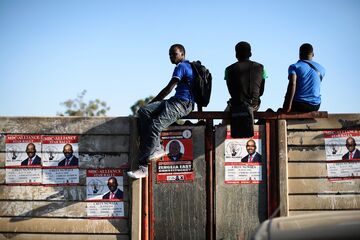By Thembisile Dzonzi
Updated on
- Stocks seen as a way to preserve wealth amid inflation fears
- Political reform important for Zimbabwe’s recovery: Allan Gray
 Election posters
hang on a wall as people watch MDC-Alliance (Movement for Democratic Change)
leader and opposition presidential candidate Nelson Chamisa speaking during a
rally on July 26, 2018 in Chitungwiza, Zimbabweans. Photographer: Dan Kitwood/Getty
Images
Election posters
hang on a wall as people watch MDC-Alliance (Movement for Democratic Change)
leader and opposition presidential candidate Nelson Chamisa speaking during a
rally on July 26, 2018 in Chitungwiza, Zimbabweans. Photographer: Dan Kitwood/Getty
ImagesZimbabwean stocks are rising before Monday’s election. But in the topsy-turvy world of the country’s equities market, that’s not necessarily a sign of investor confidence.
The Harare exchange’s benchmark index has climbed 10 percent since the election date was set on May 30. The gains suggest Zimbabweans are continuing to use equities as a refuge to preserve their wealth, concerned that there is a risk of inflation as the government prints dollar-denominated bond notes to overcome a shortage of hard currency.

About 5.6 million people have registered to vote for a new president, lawmakers and local government representatives. The front-runners in the presidential contest are Emmerson Mnangagwa, who became Zimbabwe’s leader in November when the ruling party forced an end to Robert Mugabe’s 37-year rule, and Nelson Chamisa, a lawyer and church pastor from the main opposition.
“Whoever gets elected, the economic challenges are quite paramount,” said Nick Ndiritu, Cape Town-based co-manager at Allan Gray, whose $433 million Africa equity fund has outperformed 96 percent of peers this year, according to data compiled by Bloomberg. “We’re looking to make sure it’s a credible election that is respected by both the politicians as well as the military establishment, which then helps the country to tick the box on political reform, which for us is an important preamble to Zimbabwe’s recovery,” he said in an interview.
“Whoever gets elected, the economic challenges are quite paramount,” said Nick Ndiritu, Cape Town-based co-manager at Allan Gray, whose $433 million Africa equity fund has outperformed 96 percent of peers this year, according to data compiled by Bloomberg. “We’re looking to make sure it’s a credible election that is respected by both the politicians as well as the military establishment, which then helps the country to tick the box on political reform, which for us is an important preamble to Zimbabwe’s recovery,” he said in an interview.
Ndiritu’s fund, which excludes South Africa, had a 22 percent weighting in Zimbabwean equities as of June 30. Allan Gray has steadily discounted the value of those holdings since December 2016 as the cash crisis created a steeper premium in prices. The asset manager’s valuation of the Harare-traded stocks it holds implies a 60 percent discount to market prices, as of the end of June. “In other words, we are effectively discounting a dollar in Zimbabwe to 40 U.S. cents,” the firm said in a note to clients.
Among the reasons for the bullish run in Zimbabwe equities is low activity in the property market caused by the scarcity of dollars and sellers demanding cash in hard currency, said Innocent Maponde, a trader at Unum Capital in Johannesburg. “This leaves the investor with only one choice, which is the equities market.”
The best-performing stocks this year in Harare include Zimplow Holdings Ltd. and Seed Co., gains that are in line with farming sectors that Ndiritu at Allan Gray identifies as standing to benefit if Zimbabwe can navigate successful elections and proceed to economic reforms.
“The underlying demand is still quite strong -- we are starting to see tobacco and a lot of agricultural production picking up and clearly these are sectors that will benefit from that renewed sense of optimism,” Ndiritu said.
(Adds comment by trader on property market in third-last paragraph


No hay comentarios:
Publicar un comentario
No se admiten comentarios con datos personales como teléfonos, direcciones o publicidad encubierta